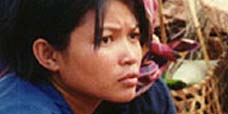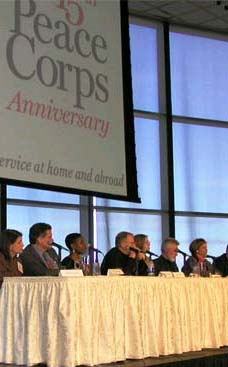2006.04.18: April 18, 2006: Headlines: COS - Mauritania: Illness: Schistosomiasis: Medicine: Journal News: Mauritania RPCV Jean Marie Naples fights back from brain injuries to continue doing research on schistosomiasis
Peace Corps Online:
Directory:
Mauritania:
Peace Corps Mauritania :
The Peace Corps in Mauritania:
2006.04.18: April 18, 2006: Headlines: COS - Mauritania: Illness: Schistosomiasis: Medicine: Journal News: Mauritania RPCV Jean Marie Naples fights back from brain injuries to continue doing research on schistosomiasis
Mauritania RPCV Jean Marie Naples fights back from brain injuries to continue doing research on schistosomiasis

As a research fellow at Johns Hopkins, Jean Marie Naples has been doing research on schistosomiasis, a disease caused by parasitic worms in water. The infection, which is mainly found in West Africa, South America and the Philippines, is known as a cause of bladder cancer and liver failure. "I'd like to continue my research," Naples said. "Someday, I'd like to go back to Africa with my research. My goal is to get rid of this disease in the world."
Mauritania RPCV Jean Marie Naples fights back from brain injuries to continue doing research on schistosomiasis
Medical researcher fights back from brain injuries at West Haverstraw hospital
By AKIKO MATSUDA
THE JOURNAL NEWS
Caption: Schoolchildren in Niger with gross haematuria (blood in urine) caused by schistosomiasis (photo courtesy of Jurg Utzinger)
WEST HAVERSTRAW — Jean Marie Naples slowly placed her right foot onto the grass in the yard at Helen Hayes Hospital, overlooking the Hudson River.
Her left foot carefully followed, as her blue-striped sneakers got slightly muddy because of the brief rain that had passed through the area Friday morning.
"This is a big deal," Naples said excitedly, using her arms to balance herself.
"This is all new," said Nancy Mason, a physical therapist assistant at the hospital while walking closely with Naples. "We're making a transition to walk on uneven surfaces with no assistive device."
For the first time since an October car accident, which severely injured Naples and left her unconscious for more than a month, the West Haverstraw native started walking outside on her own, without a cane.
Considering the injuries Naples suffered, her recovery has been outstanding, experts said. Among many factors, her tireless effort to get better definitely helped her improve, they said.
Naples, a medical researcher at the Johns Hopkins Bloomberg School of Public Health in Baltimore, said she knew the importance of rehabilitation through her experience in medicine.
She also said she thought she had been kept alive because of her mission: To save lives in developing countries. Because of her clear goal in her life, she never felt desperate even when her injuries took away her ability to sit up or walk, she said.
"I had injuries that were supposed to kill me, but they didn't," Naples said. "I really think I was left on the Earth because I'm supposed to do something. I'm supposed to get better."
On Oct. 8, Naples was taken to a Morristown, N.J., hospital after being badly injured in a one-car accident on the drive up from Baltimore to visit her parents in West Haverstraw for the weekend. The Morristown Police Department called the Haverstraw police, and a Haverstraw officer informed her parents.
"I was waiting for her to come home, and that was when the policeman came," her mother, Antoinette Naples, said recently as she choked up with tears. "We went down there, and we were told that 72 hours would be her turning point."
When Antoinette Naples arrived at the hospital with her husband, Ralph, their daughter was lying in an operating room, where doctors were draining blood from her head for a subdural hematoma.
In addition to the brain injury, the accident fractured Naples' neck and right arm, and damaged a lung.
While she remained unconscious, family members took turns around the clock staying at her hospital bedside. They constantly talked to her and played music, hoping she would regain consciousness.
After about three weeks, while she was still unconscious, Jean Marie Naples was taken by ambulance to Helen Hayes Hospital. She was in traction in a halo device to keep her head and neck still.
"We were not clear if she was going to improve from where she was," said Dr. Glenn Seliger, a neurologist who has seen Jean Marie Naples since her arrival at the Helen Hayes five months ago.
After a couple of weeks, she woke up and started vigorous rehabilitation, working with therapists at the hospital. She has since been discharged and now goes there three times a week for physical and occupational therapy.
"She's one of the most compliant patients I've ever seen," Mason said. "She does homework and more, and comes in with more problems, more issues and more ideas that she wants to work on in her therapy. She knows what she wants to achieve, and she keeps on breaking barriers."
As a research fellow at Johns Hopkins, Jean Marie Naples has been doing research on schistosomiasis, a disease caused by parasitic worms in water. The infection, which is mainly found in West Africa, South America and the Philippines, is known as a cause of bladder cancer and liver failure.
According to a research paper she co-wrote with Clive Shiff and Rolf U. Halden and published in the November issue of the American Journal of Tropical Medicine and Hygiene, applying a certain cedarwood oil mixture to the parasite-infested water surface could reduce the infections that affect more than 200 million people worldwide.
Jean Marie Naples said she had seen patients with the infections when she was a Peace Corps researcher in Mauritania in West Africa. Completing the research and applying the result to save lives in the affected countries have been her goals, she said.
Despite the severity of her injuries, her goals remain.
"I'd like to continue my research," Naples said. "Someday, I'd like to go back to Africa with my research. My goal is to get rid of this disease in the world."
When this story was posted in April 2006, this was on the front page of PCOL:





Peace Corps Online The Independent News Forum serving Returned Peace Corps Volunteers
 | The Peace Corps Library
The Peace Corps Library is now available online with over 40,000 index entries in 500 categories. Looking for a Returned Volunteer? Check our RPCV Directory. New: Sign up to receive PCOL Magazine, our free Monthly Magazine by email. Like to keep up with Peace Corps news as it happens? Sign up to recieve a daily summary of Peace Corps stories from around the world. |
 | PCOL readership increases 100%
Monthly readership on "Peace Corps Online" has increased in the past twelve months to 350,000 visitors - over eleven thousand every day - a 100% increase since this time last year. Thanks again, RPCVs and Friends of the Peace Corps, for making PCOL your source of information for the Peace Corps community. And thanks for supporting the Peace Corps Library and History of the Peace Corps. Stay tuned, the best is yet to come. |
 | History of the Peace Corps
PCOL is proud to announce that Phase One of the "History of the Peace Corps" is now available online. This installment includes over 5,000 pages of primary source documents from the archives of the Peace Corps including every issue of "Peace Corps News," "Peace Corps Times," "Peace Corps Volunteer," "Action Update," and every annual report of the Peace Corps to Congress since 1961. "Ask Not" is an ongoing project. Read how you can help. |
 | PC announces new program in Cambodia
Director Vasquez and Cambodia's Deputy Chief of Mission Meng Eang Nay announced a historic new partnership between the Peace Corps and the Kingdom of Cambodia that will bring volunteers to this Southeast Asian country for the first time. Under King Norodom Sihamoni and Prime Minister Hun Sen, Cambodia has welcomed new partnerships with the U.S. government and other U.S. organizations. |
 | Peace Corps suspends program in Bangladesh
Peace Corps Director Gaddi H. Vasquez announced the suspension of the Peace Corps program in Bangladesh on March 15. The safety and security of volunteers is the number one priority of the Peace Corps. Therefore, all Peace Corps volunteers serving in Bangladesh have safely left the country. More than 280 Peace Corps volunteers have served in Bangladesh since the program opened in November 1998. Latest: What other newspapers say. |
 | Invitee re-assigned after inflammatory remarks
The Peace Corps has pulled the invitation to Derek Volkart to join the Morocco Training Program and offered him a position in the Pacific instead after officials read an article in which he stated that his decision to join the Peace Corps was in "response to our current fascist government." RPCV Lew Nash says that "If Derek Volkart spoke his mind as freely in Morocco about the Moroccan monarchy it could cause major problems for himself and other Peace Corps volunteers." Latest: Volkart reverses stance, takes new assignment in Paraguay. |
 | March 1, 1961: Keeping Kennedy's Promise
On March 1, 1961, President John F. Kennedy issues Executive Order #10924, establishing the Peace Corps as a new agency: "Life in the Peace Corps will not be easy. There will be no salary and allowances will be at a level sufficient only to maintain health and meet basic needs. Men and women will be expected to work and live alongside the nationals of the country in which they are stationed--doing the same work, eating the same food, talking the same language. But if the life will not be easy, it will be rich and satisfying. For every young American who participates in the Peace Corps--who works in a foreign land--will know that he or she is sharing in the great common task of bringing to man that decent way of life which is the foundation of freedom and a condition of peace. " |
 | Paid Vacations in the Third World?
Retired diplomat Peter Rice has written a letter to the Wall Street Journal stating that Peace Corps "is really just a U.S. government program for paid vacations in the Third World." Director Vasquez has responded that "the small stipend volunteers receive during their two years of service is more than returned in the understanding fostered in communities throughout the world and here at home." What do RPCVs think? |
 | RPCV admits to abuse while in Peace Corps
Timothy Ronald Obert has pleaded guilty to sexually abusing a minor in Costa Rica while serving there as a Peace Corps volunteer. "The Peace Corps has a zero tolerance policy for misconduct that violates the law or standards of conduct established by the Peace Corps," said Peace Corps Director Gaddi H. Vasquez. Could inadequate screening have been partly to blame? Mr. Obert's resume, which he had submitted to the Peace Corps in support of his application to become a Peace Corps Volunteer, showed that he had repeatedly sought and obtained positions working with underprivileged children. Read what RPCVs have to say about this case. |
 | Why blurring the lines puts PCVs in danger
When the National Call to Service legislation was amended to include Peace Corps in December of 2002, this country had not yet invaded Iraq and was not in prolonged military engagement in the Middle East, as it is now. Read the story of how one volunteer spent three years in captivity from 1976 to 1980 as the hostage of a insurrection group in Colombia in Joanne Marie Roll's op-ed on why this legislation may put soldier/PCVs in the same kind of danger. Latest: Read the ongoing dialog on the subject. |
 | Friends of the Peace Corps 170,000 strong
170,000 is a very special number for the RPCV community - it's the number of Volunteers who have served in the Peace Corps since 1961. It's also a number that is very special to us because March is the first month since our founding in January, 2001 that our readership has exceeded 170,000. And while we know that not everyone who comes to this site is an RPCV, they are all "Friends of the Peace Corps." Thanks everybody for making PCOL your source of news for the Returned Volunteer community. |
Read the stories and leave your comments.

Some postings on Peace Corps Online are provided to the individual members of this group without permission of the copyright owner for the non-profit purposes of criticism, comment, education, scholarship, and research under the "Fair Use" provisions of U.S. Government copyright laws and they may not be distributed further without permission of the copyright owner. Peace Corps Online does not vouch for the accuracy of the content of the postings, which is the sole responsibility of the copyright holder.
Story Source: Journal News
This story has been posted in the following forums: : Headlines; COS - Mauritania; Illness; Schistosomiasis; Medicine
PCOL32486
95



















